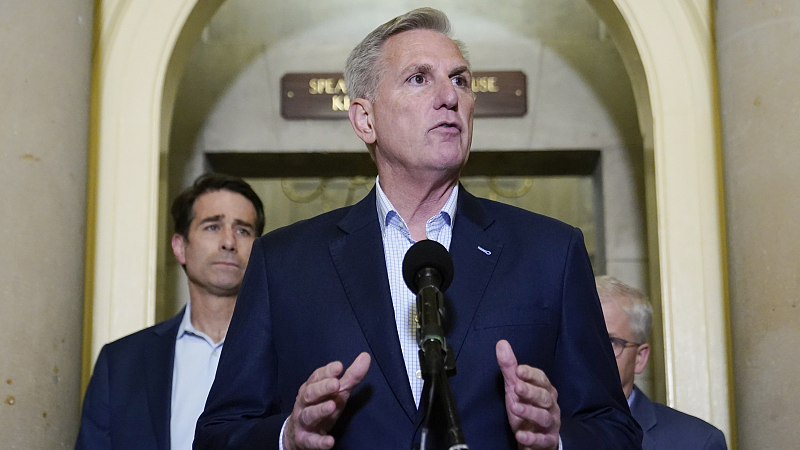
House Speaker Kevin McCarthy speaks during a news conference after President Joe Biden and McCarthy reached an "agreement in principle" to resolve the looming debt crisis on Capitol Hill in Washington, D.C., U.S., May 27, 2023. /CFP
House Speaker Kevin McCarthy speaks during a news conference after President Joe Biden and McCarthy reached an "agreement in principle" to resolve the looming debt crisis on Capitol Hill in Washington, D.C., U.S., May 27, 2023. /CFP
Editor's note: Daryl Guppy, a special commentator on current affairs for CGTN, is an international financial technical analysis expert. He has provided weekly Shanghai Index analysis for mainland Chinese media for more than a decade. Guppy appears regularly on CNBC Asia and is known as "The Chart Man." He is a former national board member of the Australia China Business Council. The article reflects the author's opinions and not necessarily those of CGTN.
The U.S. debt crises have been resolved and global economies can breathe a sigh of relief.
Not so fast.
An agreement in-principle remains a long way from an agreement in-practice. The agreement was negotiated by House Speaker Kevin McCarthy. He leads a fragile and fractured slim majority in Congress. It took 15 rounds of voting for him to win the speakership.
The same hardcore group which blocked his appointment will be critical to making this in-principle agreement work. There are no guarantees that McCarthy will be able to convince the so-called Freedom Caucus containing hard-right members of the Republican Party to support the in-principle agreement.
A former senior Republican who led negotiations on trillion-dollar spending cuts during a previous debt ceiling crisis says there may be much more political resistance to the latest agreement than markets are factoring in.
Now vice chairman of investment bank Moelis & Co. Eric Cantor said "I suspect there are a significant number of Republicans who are not going to vote for anything that Biden would agree to anyway."
The disintegration of functional government after the Capitol riot two years ago means these limits of cooperation are more likely to be tested, and may yet fail.
And even if they do agree to lift the debt ceiling it does nothing to resolve the underlying structural debt problem. The United States oversees the world's largest debt trap valued at some $31.4 trillion and potentially about to rise. It's a debt trap of its own making and apparently unstoppable. It's a global story built upon a foundation of debt and, up until now, the willing extension of credit through the purchase of U.S. debt instruments by many countries to support both domestic profligacy and a gargantuan global military footprint.
Any lift in the debt ceiling is a temporary solution to an entrenched problem which global lenders are increasingly unwilling to fund.
Already the intense debate about the debt ceiling impacts on U.S. creditworthiness and the status of the U.S. dollar. It could spook foreign investors and governments, who are major holders of U.S. debt. This threatens the nation's ability to finance itself on terms as favorable as in the past. It is already forcing the United States to pay record-high interest rates in some bond sales.

Inevitably this upsets the dollar's international standing. It's more serious this time because respect for the dollar has fallen as it has been weaponized by former president Donald Trump, President Joe Biden and sanctions. There are now alternatives to this abuse of the privilege of managing a global reserve currency.
Should the in-principle agreement fail, then the so-called X date of June 1 comes back into play. This means federal government wages are not paid, and settlement of commercial transactions by government offices is delayed. It has happened before and it is not the end of the world for financial or debt markets.
These steps in the debt trap dance were performed by both President Bill Clinton and Barack Obama, but this time it's tenser because of what we might call the double XX date on June 15. This is when interest payments are due on market debt. That hasn't been missed before.
That is the primary financial market risk and it will not be fully evident until markets resume trading on May 30 as Congress meets after the Memorial Day holiday. Failure to raise the debt ceiling remains an option.
This attempt to defund the government leads to increased disruption of the normal process of government and an increase in its inability to deliver economic security to its citizens. International investors would reduce their financing of U.S. debt and seek emerging alternatives. Borrowers would see higher interest rates in the commercial market which kills economic growth. Economic destruction is one way to battle inflation but it acts as a drag on an already sluggish global economy.
This is a hinge in the global future. The growth of cooperative political and trade organizations linking the Global South provides a lattice of support and alternatives that did not exist in previous U.S. debt disputes.
The Shanghai Cooperation Organization, the China-Central Asia Summit mechanism, the BRICS and the Belt and Road Initiative all deliver alternative solutions to a dollar-denominated trade environment. There is a unity of purpose that stands in contrast to a hegemony undermined by an economy at war with itself.
This is a debt trap of America's own construction. The entrenched vitriol of American politics means its immediate resolution remains an open question. America may yet step on the pressure plate that triggers the trap jaws to close.
But one thing is certain: If not this time, then there will be a next time as America continues to feed its insatiable appetite for debt.
(If you want to contribute and have specific expertise, please contact us at opinions@cgtn.com. Follow @thouse_opinions on Twitter to discover the latest commentaries in the CGTN Opinion Section.)